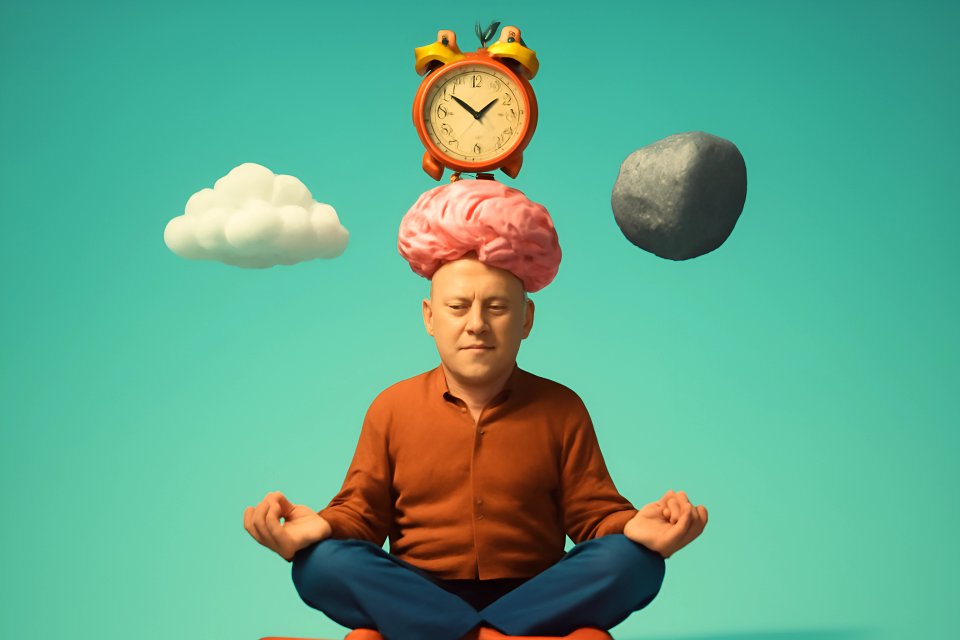
Does the 3 AM wake-up call sound familiar? You stare at the ceiling, your mind racing, while the rest of the world is quiet. You’re not alone. For many of us over 50, a full night of deep, restorative sleep can feel like a distant, almost mythical, memory.
This isn't a personal failing. It’s a physiological shift, a natural part of the journey we’re all on. But that doesn't mean you have to accept exhaustion as your new normal. Your vitality, your clarity, and your joy depend on reclaiming your rest.
The good news is you don’t have to settle for restless nights and groggy mornings. This guide is dedicated to gentle, natural, and science-backed restful sleep strategies for seniors specifically designed to help you overcome sleep disruptions. We'll skip the quick fixes and focus on building sustainable habits that deliver the deep, healing sleep you deserve.
Why Sleep Can Be More Elusive After 50
Ever wonder why sleep suddenly feels like a puzzle you can't solve? The rules of the game have changed, and understanding the new playbook is the first step toward winning back your nights. It’s not just in your head; your body is undergoing real, tangible shifts that directly impact your ability to rest.
These changes are a fundamental part of aging, but they don't have to be a life sentence of fatigue. According to the National Sleep Foundation, several key factors are at play. By acknowledging them, you can start working with your body instead of against it.
Here’s a look at what’s happening behind the scenes:
- Shifting Circadian Rhythms: Your internal "body clock" can advance with age. This is why you might feel sleepy earlier in the evening but find yourself wide awake before the sun rises.
- Hormonal Changes & Melatonin: The production of melatonin, the crucial hormone that signals your body it's time for sleep, naturally declines as we get older. This makes it harder to fall asleep and stay asleep.
- Lighter Sleep Stages: Seniors tend to spend more time in the lighter stages of sleep. This makes you more susceptible to being woken up by noise, light, or discomfort.
- Common Health-Related Disruptions: Chronic pain from conditions like arthritis, nocturia (the need to urinate frequently at night), and the side effects of certain medications can all fragment your sleep.
Daytime Habits: Setting the Stage for a Restful Night
Your quest for better sleep doesn’t begin when you pull back the covers. It starts the moment your feet hit the floor in the morning. The choices you make throughout the day create a powerful ripple effect that determines the quality of your rest hours later.
Think of your day as the foundation upon which a peaceful night is built. A shaky, inconsistent foundation leads to a collapse. But a strong, intentional one can support the deep, restorative sleep you crave.
By integrating a few simple, mindful habits into your daily life, you send clear signals to your body and brain, preparing them for a successful night. These aren't drastic overhauls; they are small, powerful adjustments that align your body with its natural sleep-wake cycle. For more ideas, explore these mindful daily routines for increased energy.
Embrace Morning Sunlight
Your secret weapon against a misaligned body clock is the sun. Step outside for 10-15 minutes of natural light shortly after you wake up. Don't wear sunglasses for this brief period if you can.
This simple act does something remarkable. It sends a direct signal to your brain to shut down melatonin production and anchor your circadian rhythm for the day. This makes you feel more alert in the morning and, crucially, sleepier at the appropriate time in the evening.
Mindful Movement for Better Sleep
Movement is medicine, especially for sleep. Regular, low-impact exercise like a brisk walk, tai chi, or gentle yoga can significantly improve sleep quality by reducing stress and anxiety. It helps you fall asleep faster and spend more time in deep sleep.
The key is timing. Aim to finish any moderate exercise at least three to four hours before your intended bedtime to give your body ample time to cool down. For inspiration, check out these sustainable low-impact workouts for seniors that are both effective and gentle on your joints.
The Smart Napping Strategy
Feeling that afternoon slump? A nap can be a powerful tool, but only if you use it wisely. A poorly timed or overly long nap can sabotage your nighttime sleep.
If you need to recharge, keep your nap short—no more than 20-30 minutes. This is long enough to improve alertness without letting you slip into the deeper stages of sleep that cause grogginess. The best time for this power nap is in the early afternoon, ensuring it won't interfere with your ability to fall asleep later.
Your Wind-Down Ritual: Crafting a Pre-Sleep Sanctuary
You wouldn't slam on the brakes at 60 miles per hour. So why expect your brain to go from full-speed ahead to a dead stop the moment your head hits the pillow? A successful transition to sleep requires a dedicated wind-down period—a sacred ritual that tells your body and mind that the day is done.
This pre-sleep sanctuary is your buffer against the stress and stimulation of the modern world. It’s a non-negotiable hour dedicated to calming your nervous system and preparing for deep rest. This is where you take back control from the anxieties that often surface in the quiet of the night.
Creating this ritual is one of the most powerful investments you can make in your health. It’s a profound act of self-care that pays dividends in the form of energy, clarity, and resilience. For a deeper dive, explore these mindful evening routines to optimize sleep quality.
The "Power Down" Hour: Dim Lights & Disconnect
One hour before bed, declare a digital sunset. Dim the lights in your home and, most importantly, turn off all screens—your television, your phone, your tablet. The blue light emitted from these devices is a notorious enemy of sleep, tricking your brain into thinking it's still daytime and suppressing melatonin production.
Instead of scrolling, pick up a physical book or listen to calming music or a podcast. This simple switch removes the primary obstacle to your body's natural sleep process. It’s a small change with a massive impact.
Soothing Sips and Gentle Warmth
Harness the ancient power of botanicals to soothe your system. A warm, caffeine-free herbal tea can work wonders as a natural insomnia remedy for older adults. According to a review published by the National Center for Biotechnology Information, German chamomile contains an antioxidant called apigenin that binds to specific receptors in your brain, helping to decrease anxiety and initiate sleep.
Another powerful technique is a warm bath or shower. The magic isn't just the relaxing warmth itself; it's the subsequent drop in your core body temperature after you get out. This temperature drop is a powerful natural signal to your body that it's time to sleep.
Quiet Your Mind: Simple Relaxation Techniques
If a racing mind is your primary foe, you need tools to fight back. Simple relaxation techniques can shift your focus from worry to tranquility. One of the most effective is Box Breathing.
Here's how to do it:
1. Inhale slowly through your nose for a count of 4.
2. Hold your breath for a count of 4.
3. Exhale slowly through your mouth for a count of 4.
4. Hold your breath at the end for a count of 4.
Repeat for 5-10 cycles.
Another powerful practice is gratitude journaling. Before you turn out the light, write down three specific things you were grateful for that day. This practice shifts your brain out of a problem-solving or worry state and into one of appreciation, creating the perfect mental landscape for sleep. For more techniques, explore these methods for stress reduction for seniors.
Optimizing Your Bedroom for Uninterrupted Sleep
Your bedroom should be a cave—a sanctuary dedicated to nothing but rest and intimacy. Too often, it becomes a multi-purpose room for work, entertainment, and worry. To achieve the best sleep possible, you must reclaim your bedroom as a haven for slumber.
The environment you sleep in has a profound impact on your sleep quality. Light, temperature, and sound can either support or sabotage your efforts. Taking the time to optimize these elements is a critical step in your journey to better rest.
Making these adjustments can transform your bedroom from a source of frustration into your greatest sleep ally.
- Keep it Cool: The ideal sleep temperature is surprisingly cool, between 60-67°F (15-19°C). A cooler room helps facilitate the natural drop in body temperature needed for sleep.
- Keep it Dark: Light is the enemy of melatonin. Use blackout curtains or a comfortable eye mask to create a pitch-black environment. Even a tiny bit of light can disrupt your sleep cycle.
- Keep it Quiet: Unpredictable noises can pull you out of deep sleep. Consider using earplugs or a white noise machine to mask disruptive sounds and create a consistent, soothing auditory backdrop.
- Comfort is King: An old, unsupportive mattress or pillow can be a major source of sleep-disrupting pain, especially for aging joints. Invest in a mattress and pillows that provide the right support for your body.
Nutrition for Sleep: What to Eat and When to Eat It
What you eat—and when you eat it—plays a starring role in the quality of your sleep. The right nutrients can promote relaxation and help regulate your sleep-wake cycle, while the wrong foods can leave you tossing and turning. Thinking about your diet is a key part of finding effective natural sleep solutions for seniors.
Your nutritional strategy for sleep should be twofold. First, incorporate foods that contain sleep-promoting compounds. Second, be mindful of foods and habits that can actively interfere with your rest.
Making smart nutritional choices, particularly in the hours leading up to bedtime, can be a game-changer. It’s another way to provide your body with the raw materials it needs for a night of deep, restorative sleep.
Sleep-Promoting Foods
Certain foods are rich in nutrients that can help you drift off more easily. Magnesium, for example, is a mineral that plays a role in promoting relaxation. Healthline notes that magnesium can help quiet the nervous system, making it easier to fall asleep. Foods rich in magnesium include almonds, walnuts, and spinach.
Tryptophan is an amino acid that serves as a precursor to both serotonin and melatonin. You can find it in foods like turkey, chicken, and tart cherries. A small, carbohydrate-rich snack an hour or two before bed can help make tryptophan more available to your brain.
What to Avoid Before Bed
Just as some foods help, others can hinder. Caffeine is an obvious culprit; its stimulating effects can last for hours, so it's wise to avoid it after lunch. Alcohol, while it might make you feel drowsy initially, severely disrupts the second half of your night's sleep, particularly the restorative REM stage.
Avoid large, heavy, or spicy meals within two to three hours of bedtime, as they can cause indigestion and discomfort. It's also smart to taper off your fluid intake in the evening to reduce the likelihood of nighttime bathroom trips that fragment your sleep.
A Gentle Reminder: When to Talk to Your Doctor
While these natural strategies are incredibly powerful, it's crucial to recognize when professional guidance is needed. Persistent sleep problems can sometimes be a symptom of an underlying medical condition that requires diagnosis and treatment. Your health and safety are the top priority.
Don't hesitate to be your own best advocate. If you've implemented these lifestyle changes consistently and are still struggling, it's time to have a conversation with your healthcare provider. They can help you get to the root of the issue.
According to the Mayo Clinic, it's important to seek medical advice if your insomnia is making it hard to function during the day, if it's a chronic issue, or if you suspect a condition like sleep apnea (characterized by loud snoring and pauses in breathing) or restless leg syndrome. A doctor can rule out these conditions and ensure your medications aren't contributing to the problem.
Your Journey to Better Sleep Starts Tonight
You now hold the map to reclaiming your nights. The path to deep, restorative sleep isn't about finding a single magic bullet. It's about the small, consistent, and powerful choices you make every single day.
Embrace morning light to set your body's clock. Create a sacred wind-down routine to calm your mind. Optimize your bedroom into a cool, dark, quiet sanctuary. By making these gentle changes, you are not just chasing sleep; you are investing in your vitality.
Investing in your sleep is one of the most profound ways to invest in your future. By making these small, consistent changes, you can reclaim your nights and greet each new day with the energy and clarity you deserve. Your journey to a more rested, vibrant you starts tonight.
What is one natural sleep tip that has worked for you? Share your wisdom with the FitOverFifty community in the comments below.
















